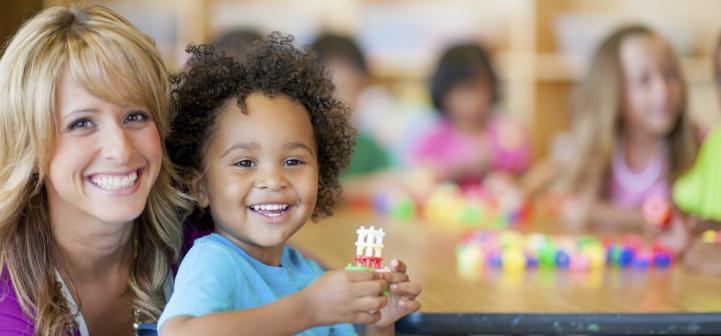
Long before they can talk, babies are developing thinking skills. As a child care provider, you probably know that most babies put objects in their mouths. But did you realize that mouthing things helps babies learn about the shape and texture of objects? Infants are constantly exploring their world, making sense of things around them, and listening to language. Child care providers can help babies practice these important thinking skills by giving them interesting objects, encouraging them to explore, asking simple questions that encourage thinking, reading books, and talking with babies during routine tasks such as feeding and diapering.
The following lists describe some common thinking and language skills that most babies achieve at different ages. This list is just a guideline. Every baby is an individual and develops on his or her own schedule.
By 4 months, most babies…
- respond to the sounds of familiar voices
- react to loud noises such as a rattle or bell
- turn their heads toward bright colors and lights
- recognize the bottle or breast
- explore objects with their mouths
- play with their fingers, hands and toes
- start making cooing sounds
By 8 months, most babies…
- cry in very different ways when they are hungry, sick, bored or need a diaper change
- make noises to share their happiness or displeasure
- look for familiar voices and sounds
- actively use their senses to learn about the world
- reach for objects and bring them close to play with
- search for toys that are hidden under a blanket, basket or container
- explore objects by touching, shaking, banging and mouthing them
- repeatedly drop objects onto the floor to see what happens
- babble expressively, as if they are talking
By 12 months, most babies…
- say their first word
- use words like “da-da” and “ma-ma” to refer to their parents and other adults
- “dance” or bounce actively to music
- show interest in short picture books
- pay attention to others’ conversations and respond appropriately
- wave bye-bye if prompted
- enjoy stacking objects and placing objects inside one another
Tips to Nurture Babies’ Language and Thinking Skills
- Provide interesting things for babies to explore. Consider wooden and foam blocks, nesting cups, shape sorters, large wooden spoons, puzzles with big knobs, balls and toys that react when babies touch them. Keep easy-to-swallow objects out of infants’ reach. Babies should not play with any object that can fit inside a paper towel tube.
- Talk with babies. Spend time face to face with each individual baby every day. Face babies when talking so they can see you and smile with you. Talk about what you are doing while feeding, washing hands and changing diapers.
- Respond to babies’ sounds. When babies make babbling or cooing sounds, echo the sounds they make. Take turns making sounds with babies, much as you would in a regular conversation. Even before babies can understand your words, they learn how to use language to have a conversation.
- Play peek-a-boo with babies. Hide your face behind a blanket, then peek out with a big smile on your face. As babies get older, encourage them to move the blanket to find you. Playing peek-a-book helps babies learn that things still exist even when they are hidden. Older babies may enjoy this game for a long time.
- Read to babies every day. Reading helps babies learn language and gives them a chance to spend close time with their child care provider. Choose books with colorful pictures. Vary your voice with the story to keep their attention. Give babies board books to explore with their hands and mouths. Reading with babies is a great way to help them develop language skills.
For More Information
To learn more about how child care providers can support infants’ development, take a look at the following eXtension Alliance for Better Child Care articles:
- Age-Appropriate Toy Ideas for Child Care
- Choosing Books for Young Children
- Disinfect Child Care Surfaces with a Bleach and Water Solution
- Other Ways to Disinfect Toys and Surfaces in Child Care Settings
- Talking with Babies in Child Care
- What Child Care Providers Can Expect in Infants’ Physical Development
- What Child Care Providers Can Expect in Infants’ Social and Emotional Development
- Why Read to Infants Before They Can Talk
Photo by Donnie Rae Jones/ CC BY https://creativecommons.org/licenses/by/2.0/
